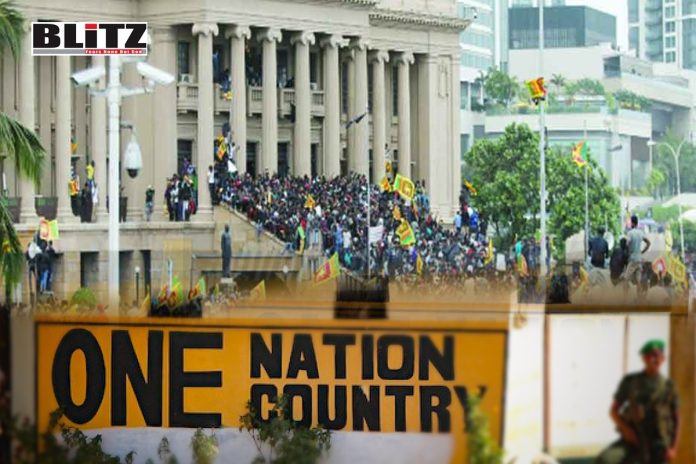In the wake of decades-long ethnic conflict, Sri Lanka finds itself at a crucial crossroads, grappling with the remnants of its turbulent past while striving for a future of enduring peace and harmony. Despite the support of the international community, including key players such as the United States, the European Union, and India, the road to reconciliation remains fraught with challenges. Drawing parallels with the post-World War II era in Europe, where concerted efforts led to a transformative shift from conflict to cooperation, Sri Lanka must seize the opportunity to embark on a journey of healing and unity. This article delves into the current state of Sri Lanka’s reconciliation endeavors, explores the obstacles hindering progress, and outlines potential pathways towards a future marked by inclusivity and shared prosperity.
Despite the unwavering support of the international community for Sri Lanka’s reconciliation endeavors, the nation finds itself ensnared in a seemingly intractable stalemate regarding its ethnic conflict. While glimpses of progress emerge in select regions, especially those shielded from the direct impacts of prolonged warfare, the entrenched wounds of division and mistrust persist as stubborn obstacles to genuine reconciliation. Beneath the surface calm of apparent peace, the profound scars inflicted by years of violence and displacement continue to seethe, casting a shadow over efforts to heal and rebuild fractured communities.
Significantly, the noticeable absence of active involvement among the youth, especially those hailing from regions deeply scarred by conflict, serves as a poignant reminder of the persistent challenge in bridging the chasm between the haunting legacies of the past and the hopeful aspirations for the future. Nonetheless, amidst this backdrop of uncertainty, there emerge faint but discernible rays of hope, symbolized by the government’s prudent choice to initiate a reduction in military presence without igniting the flames of nationalist sentiment. This strategic shift towards prioritizing economic revitalization and governance reforms not only reflects a potential inflection point in Sri Lanka’s arduous journey towards reconciliation but also underscores a nascent willingness to address underlying grievances and chart a course towards sustainable peace and prosperity.
At the crux of Sri Lanka’s endeavor towards reconciliation lies a paramount necessity: the establishment of trust and the empowerment of marginalized communities. Initiatives such as the International Human Rights Global Mission’s community empowerment event stand as tangible manifestations of a bipartisan dedication to fostering inclusivity and amplifying the voices of diversity. However, recent proposals, including the Commission for Truth, Unity, and Reconciliation Bill, have encountered significant pushback due to their perceived deficiencies in sensitivity and inadequate consultation with the populations most affected by past injustices. Addressing this trust deficit necessitates a concerted effort towards authentic dialogue and substantive engagement with the communities directly impacted by historical grievances, thereby laying a solid foundation for genuine reconciliation to take root and flourish.
Drawing upon the historical parallels observed in post-World War II Europe, wherein reconciliation was meticulously crafted through mechanisms of accountability and the cultivation of inclusive governance structures, Sri Lanka stands poised at a critical juncture to confront its tumultuous past. In this pivotal moment, it is imperative that the nation prioritizes the empowerment of victim communities within the reconciliation process. While the pursuit of accountability may undoubtedly encounter formidable obstacles, especially in instances where perpetrators retain significant influence, the imperative for a negotiated solution that centers on victim representation remains indispensable for the attainment of enduring peace. It is through such deliberate and inclusive measures that Sri Lanka can aspire towards a future characterized by sustainable reconciliation and collective healing.
The recent dialogue that transpired between diaspora groups and Buddhist monks, culminating in the historic signing of the Himalaya Declaration, stands as a monumental milestone in Sri Lanka’s journey towards reconciliation. Despite the inevitable emergence of dissenting voices, the comprehensive themes articulated within the agreement serve as compelling evidence of a collective willingness to earnestly engage in dialogue and earnestly pursue common ground. Moreover, the notable participation of esteemed senior Buddhist monks underscores the transformative potential of religious leadership in nurturing interfaith harmony and fostering a climate conducive to genuine reconciliation. As such, this momentous occasion not only signifies progress but also heralds the dawn of a new era characterized by unity, understanding, and the shared pursuit of lasting peace.
At the core of Sri Lanka’s multifaceted reconciliation endeavors lies a central imperative: the pressing need for comprehensive constitutional reform. This reform is envisioned as a pivotal mechanism aimed at empowering ethnic and religious minorities, thereby guaranteeing their substantive and meaningful involvement in the nation’s decision-making processes. Given the entrenched nature of systemic inequalities and power differentials, the recalibration of Sri Lanka’s constitutional framework assumes paramount importance in fostering a cohesive, united, and truly inclusive society. Consequently, undertaking measures to address these pervasive disparities stands as an indispensable step towards realizing the collective aspiration of building a nation where every citizen, irrespective of ethnicity or creed, is afforded equitable opportunities and representation.
Sri Lanka finds itself at a pivotal juncture in its ardent pursuit of reconciliation and lasting peace. Now, more than ever, it stands poised to glean invaluable insights from the annals of history, charting a course towards a future characterized by unity and prosperity. Through a steadfast commitment to embracing inclusive governance structures and drawing upon the wisdom gleaned from past experiences, Sri Lanka can navigate the intricate complexities of its tumultuous history. Undoubtedly, myriad challenges lie ahead, yet the nation’s indomitable spirit and unwavering dedication to fostering meaningful dialogue serve as beacons of hope illuminating the path towards a brighter tomorrow. As Sri Lanka embarks upon this transformative journey, it must remain resolute in its unwavering pursuit of justice, inclusivity, and the enduring bonds of reconciliation that will serve as the bedrock of its collective future.




